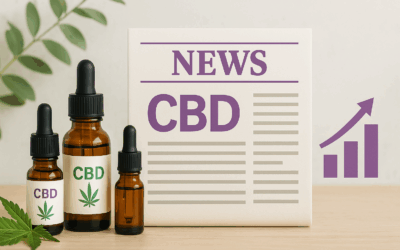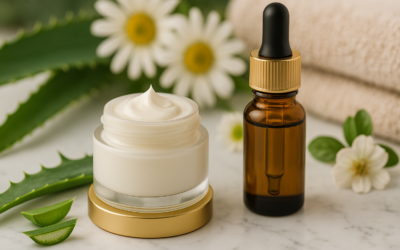Understanding CBD: A Beginner’s Guide to Benefits and Use

CBD, short for cannabidiol, is a natural compound found in the cannabis plant. Unlike THC (tetrahydrocannabinol), CBD is non-psychoactive, meaning it doesn’t produce the “high” associated with cannabis use. This makes it an appealing option for individuals seeking the therapeutic benefits of cannabis without the mind-altering effects. CBD is typically extracted from hemp plants, which contain less than 0.3% THC, making it legal in most parts of the US, including Utah.
Origins of CBD
CBD (cannabis) has been used medicinally for thousands of years, with early records showing its use in ancient Chinese, Egyptian, and Indian civilizations. Cannabis was a popular medicine in the U.S. in the 1800’s, listing it in the US Pharmacopeia, as having a wide range of applications including helping with sleep, pain relief, anti-depressant, convulsions, and rheumatism, just to name a few. It was pulled from the list as a medicine in 1942, when it was made illegal in the U.S. Fast forward to the 21st century, and CBD has become a popular wellness product, backed by ongoing research into its therapeutic potential. The 2018 Farm Bill further boosted CBD’s popularity, making hemp-derived CBD legal at the federal level in the US.
The Benefits of CBD
CBD offers a wide range of health benefits, largely due to its interaction with the body’s endocannabinoid system, which plays a role in regulating functions like sleep, mood, pain, and immune response. Some of the most commonly reported benefits include:
- Pain Relief: CBD may help manage chronic pain, such as arthritis or injury-related pain, by reducing inflammation and interacting with neurotransmitters.
- Anxiety & Stress: CBD may alleviate anxiety and stress by promoting a sense of calm and relaxation without causing sedation.
- Sleep Support: CBD can improve sleep quality, helping with conditions like insomnia or sleep disturbances.
- Skin Health: CBD has anti-inflammatory properties that may help with skin issues like acne, eczema, and psoriasis.
Common Uses of CBD in Everyday Life
CBD has made its way into a variety of products, making it easy to incorporate into daily routines. Some popular options include:
- CBD Oils & Tinctures: These are some of the most versatile forms of CBD. They can be taken sublingually (under the tongue) for fast absorption or added to food and drinks for a more gradual effect. This method usually has a 40 to 60 minute onset.
- Topicals: CBD-infused creams, roll-ons, and balms are a great way to get localized pain relief or skin care. This method has a fairly quick onset, depending on the other ingredients used in the product, usually about 5 to 30 minutes.
- Edibles: CBD gummies and other edibles provide a convenient and tasty way to consume CBD, hiding some of the cannabis flavor. This method has the slowest absorption rate because it has to pass through your digestive system. Onset is about an hour but could take longer based on your metabolism.
- Capsules & Softgels: These offer a pre-measured dose of CBD, making them ideal for people looking for a consistent intake.The onset is about 45 minutes to 1 hour, also depending on your metabolism.
- Vapes: Through inhalation is the fastest way to get CBD into your system, allowing the compound to enter your bloodstream more quickly. The onset is usually 5 to 10 minutes, however it doesn’t stay in your system as long, effects peaking at 30 to 60 minutes.
The onset times mentioned above are a baseline guide, individual results may vary depending on environmental factors, body weight, gender, and metabolism.
Conclusion
Whether you’re looking for natural pain relief, a way to manage anxiety, or simply want to improve your overall wellness, CBD offers a wide range of benefits and uses. As research and education continues to expand, using CBD as a holistic remedy grows, making it a great option for those seeking natural alternatives to conventional treatments. It’s important to consult with a healthcare provider, especially if you’re new to CBD, to ensure it’s right for your needs.
Browse All Posts ⇒
Related Posts:
What’s Really Happening with CBD Right Now (Q1 2025)
Stay informed with the latest CBD news, learn how developments impact consumers and businesses, and explore predictions for the future of the CBD industry.
Revolutionize Your Skincare Routine with CBD
Discover how CBD can transform your skincare routine. Learn about its benefits for your skin, tips for choosing and using CBD products, and inspiring success stories from users.
Integrating Mindfulness and Meditation into Your Daily Routine
Learn the basics of mindfulness and meditation, their benefits for mental and physical health, and simple exercises to seamlessly integrate these practices into your daily routine.




0 Comments